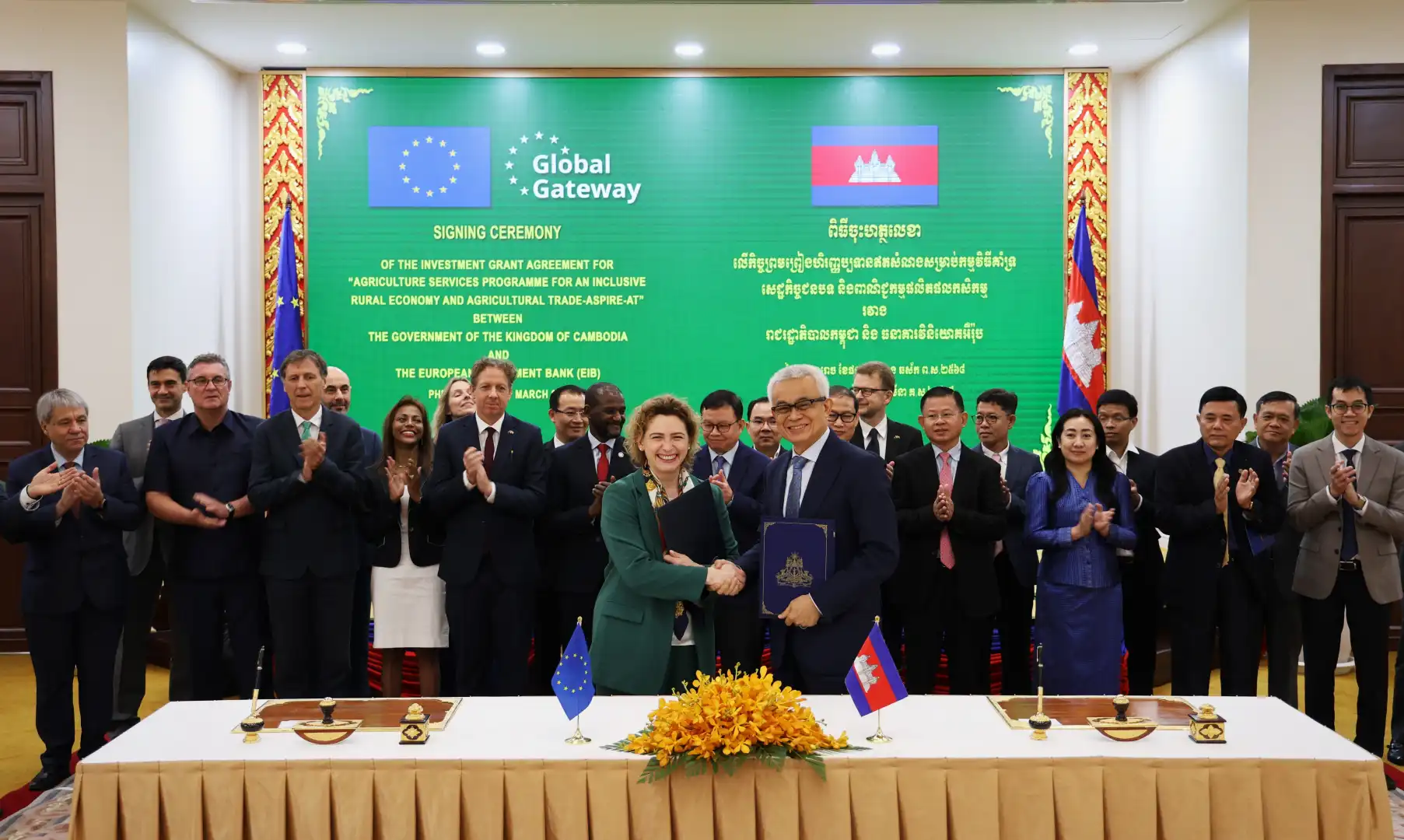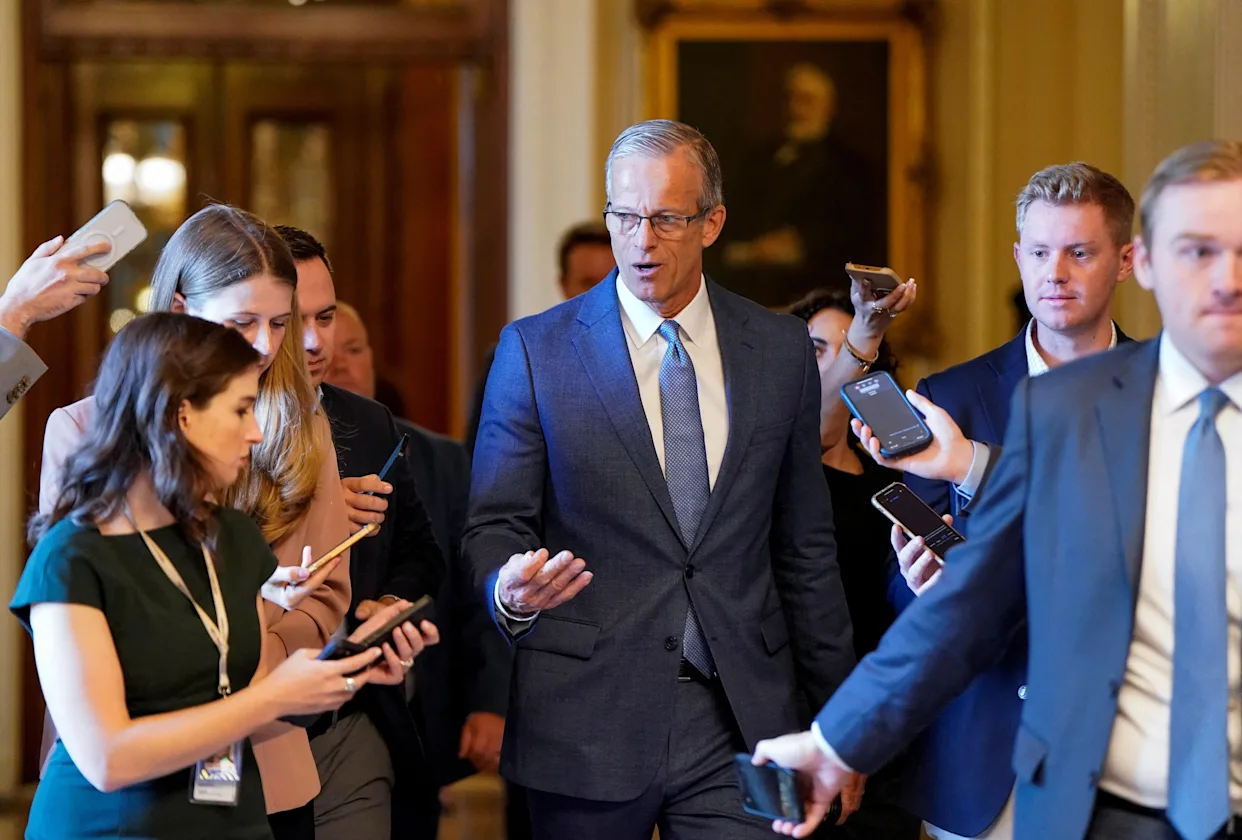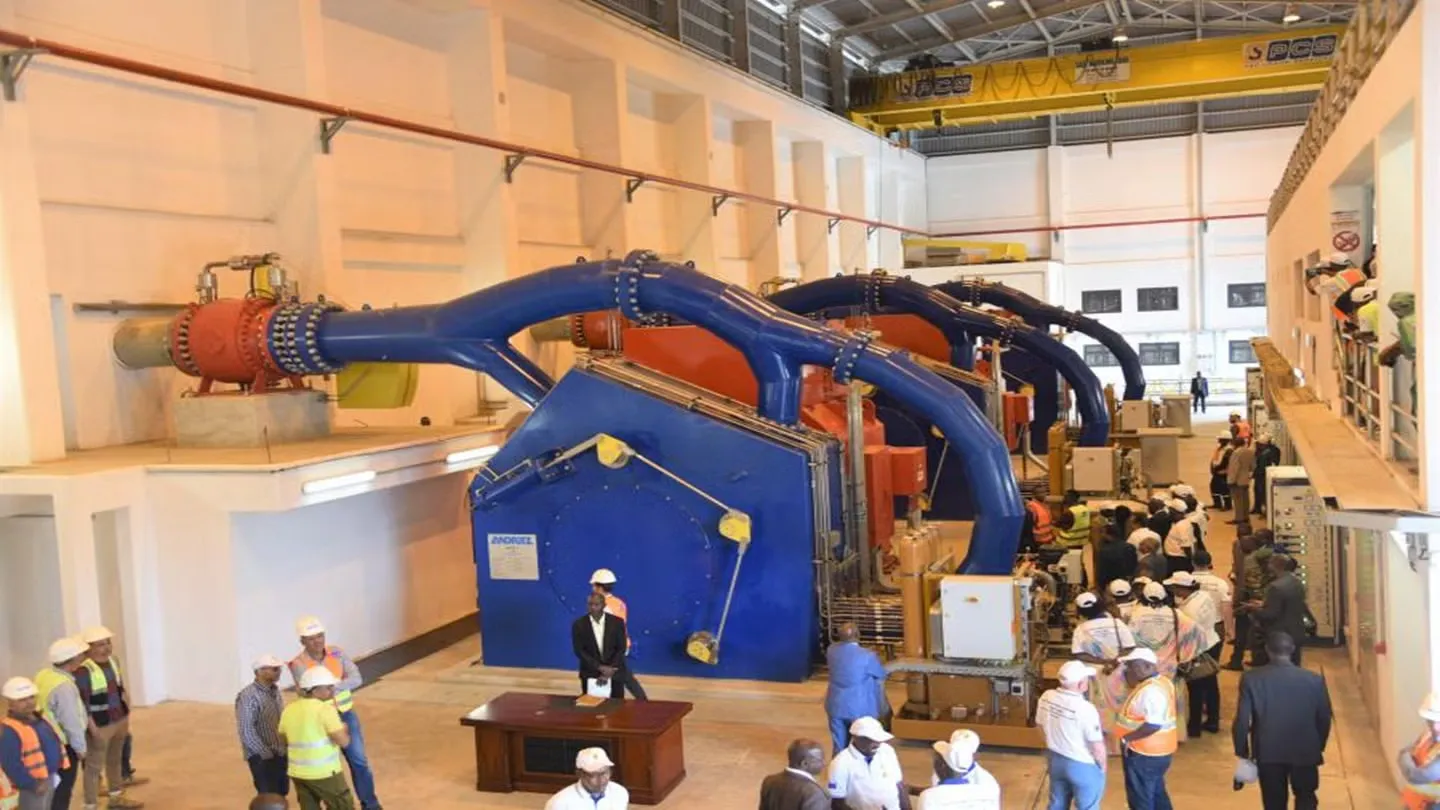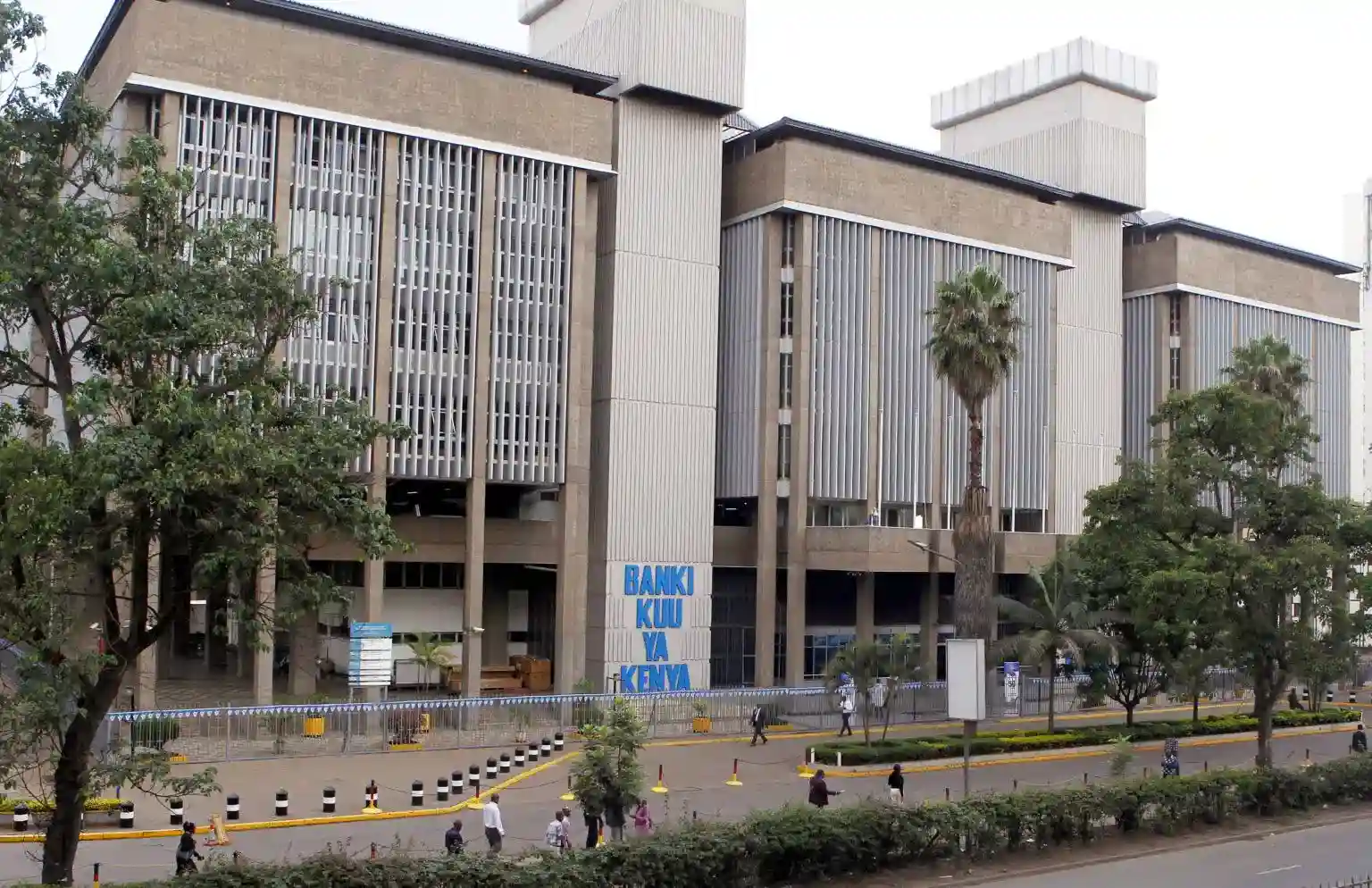Cambodia is set to undergo a transformative shift in its agricultural landscape with an ambitious nearly €80 million investment package from the European Union and its partners. The multi-faceted programme, which blends an EIB Global loan, an EU grant, and technical assistance, aims not only to modernise farming practices and infrastructure but also to empower rural communities, strengthen food security, and pave the way for enhanced domestic and global market integration.
A Comprehensive Investment Package for Sustainable Growth
The new initiative, formally launched in Phnom Penh on March 17, 2025, is built around the Agriculture Services Programme for an Inclusive Rural Economy and Agricultural Trade (ASPIRE-AT). It represents a historic commitment by the European Union, the European Investment Bank (EIB) Global, and the International Fund for Agricultural Development (IFAD) to propel Cambodia’s agricultural sector into a new era. With €60 million in loans from EIB Global, a €15 million EU grant, and an additional €4.5 million earmarked for technical assistance, the total EU-backed investment nears €80 million. Complementing this, IFAD has committed $49 million in co-financing, underscoring the global support for Cambodia’s sustainable development journey.
The multi-layered funding structure of this programme illustrates a coordinated effort to address several critical aspects of the agricultural value chain. From modernising production techniques and upgrading critical infrastructure to improving sanitary and phytosanitary capacities and enhancing market connectivity, the investment is designed to offer a holistic boost to Cambodia’s rural economy.
Aligning with the EU’s Global Gateway Strategy
This investment forms a key part of the European Union’s Global Gateway strategy, an initiative aimed at promoting sustainable growth, climate resilience, and inclusive economic development across partner nations. Under the Global Gateway, the EU is leveraging its financial strength, technical expertise, and diplomatic influence to support development projects that create long-term benefits. In Cambodia’s case, the focus on agriculture addresses both immediate needs—such as increased productivity and improved market access—and longer-term challenges, including rural poverty, environmental sustainability, and food safety.
The Global Gateway strategy, which echoes the EU’s broader ambitions of “Team Europe,” seeks to counterbalance geopolitical shifts by strengthening economic and developmental ties with strategic partners. By channeling investment into Cambodia’s agricultural sector, the EU is not only fostering economic resilience in one of Southeast Asia’s emerging markets but also creating a model that can be replicated in other regions facing similar challenges.
Modernising Infrastructure and Enhancing Food Safety
A cornerstone of the ASPIRE-AT programme is the planned upgrade of critical agricultural infrastructure. One of the flagship projects includes the expansion of the National Agricultural Laboratory. This modernisation effort will bolster Cambodia’s capacity to monitor food safety, support research initiatives, and enforce stringent quality control measures across various agricultural products. With improved laboratory facilities and enhanced diagnostic tools, local producers can meet international standards more effectively, thus opening new export avenues and elevating the global reputation of Cambodian agricultural goods.
Another significant component of the investment is the construction of the Kaoh Khsach Tonlea bridge. This new infrastructure project is designed to bridge geographic gaps that have long impeded efficient transport and market access. By linking an isolated island community to the mainland, the bridge will not only facilitate the swift movement of bulk produce but will also integrate rural economies with urban centres. Improved connectivity is expected to reduce post-harvest losses, lower transportation costs, and create a more dynamic market environment where producers can negotiate better prices for their goods.
Empowering Farmers and Rural Communities
At the heart of this initiative is the commitment to uplift smallholder farmers and rural households, who form the backbone of Cambodia’s agricultural sector. The programme is set to directly benefit 100,000 smallholder farmers, 25,000 land-poor households, and 500 agricultural enterprises. The funding will provide these groups with much-needed tools, modern equipment, and technical know-how to transform traditional farming practices into modern, sustainable operations.
Special emphasis is being placed on inclusivity. Recognising that rural development must benefit all segments of society, the programme has earmarked provisions to empower women, engage young people, and support indigenous communities. This approach is expected to create new income opportunities, foster entrepreneurship, and ensure that the benefits of economic growth are widely distributed across the community.
Furthermore, the initiative aims to build strong partnerships between local agricultural cooperatives and agribusinesses. By facilitating access to financing and providing capacity-building support, the programme will enable these groups to negotiate better terms in both domestic and international markets. This collaborative model is envisioned as a blueprint for a more integrated and competitive agricultural sector in Cambodia.
The Broader Economic Impact
Beyond its direct effects on the agricultural sector, this investment is expected to have wide-ranging implications for Cambodia’s overall economic development. Agriculture remains a vital contributor to the country’s GDP, and modernising this sector can have a multiplier effect on the entire economy. As smallholder farmers become more productive and market-savvy, increased incomes are likely to spur growth in related sectors such as retail, transportation, and processing industries.
Cambodia’s ambitious goal to transition to an upper-middle-income country by 2030—and eventually a high-income country by 2050—is underpinned by such targeted investments in critical sectors. The ASPIRE-AT programme, therefore, not only addresses the immediate needs of rural communities but also plays a strategic role in the nation’s long-term economic planning. By aligning with the government’s Pentagonal Strategy (Phase I), this initiative reinforces Cambodia’s commitment to structural reforms that are expected to generate sustained economic growth.
Industry analysts also highlight the potential of this programme to stimulate private sector investment. As the agricultural value chain becomes more robust and transparent, there will be increased confidence among investors to explore opportunities in rural markets. This could lead to further investments in areas like agro-processing, food packaging, and export logistics, thereby creating a virtuous cycle of growth and innovation.
Technological Advancements and Capacity Building
In today’s rapidly evolving global economy, technology plays an indispensable role in enhancing productivity and efficiency. Recognising this, the ASPIRE-AT programme includes substantial funding for technical assistance aimed at modernising production processes and management practices in agriculture. This technical support will cover a range of areas, including precision agriculture, digital market platforms, and advanced supply chain management.
Precision agriculture, which utilises data analytics, remote sensing, and automated machinery, is poised to revolutionise traditional farming practices. By implementing these technologies, smallholder farmers in Cambodia can optimize the use of inputs such as water, fertilizers, and pesticides. This not only boosts yields but also minimises environmental impacts—a crucial consideration in today’s context of climate change and sustainability.
Digital platforms will further enhance market access by connecting farmers directly with buyers, both domestically and internationally. These platforms can help reduce the role of intermediaries, ensuring that farmers receive a fairer share of the profits from their produce. Moreover, enhanced data connectivity will facilitate real-time monitoring of market trends, enabling producers to make more informed decisions about crop planning and marketing strategies.
Capacity building is another critical component of the programme. Training initiatives will be rolled out to educate farmers on new agricultural techniques, financial literacy, and business management skills. Such capacity-building efforts are essential for ensuring that technological advancements translate into tangible benefits for rural communities. By empowering farmers with knowledge and skills, the programme is laying the groundwork for a more resilient and competitive agricultural sector.
Environmental Sustainability and Climate Resilience
Cambodia’s agricultural sector, like many in Southeast Asia, faces significant challenges from climate change. Erratic weather patterns, prolonged droughts, and flooding have increasingly threatened crop yields and livelihoods. The ASPIRE-AT programme is designed with a strong focus on environmental sustainability and climate resilience. By integrating sustainable farming practices with modern technologies, the initiative aims to mitigate the adverse effects of climate change.
Investments in infrastructure, such as upgraded irrigation systems and improved storage facilities, are expected to enhance the capacity of farmers to cope with climate variability. Additionally, the expansion of sanitary and phytosanitary facilities will ensure that agricultural products meet international safety standards, even as changing environmental conditions demand stricter controls.
The programme also emphasises the importance of preserving local ecosystems and biodiversity. By promoting organic farming techniques and sustainable land management practices, it seeks to balance increased agricultural productivity with environmental stewardship. This approach not only protects natural resources for future generations but also enhances the long-term viability of Cambodia’s agricultural exports.
Regional Comparisons and Strategic Implications
Cambodia’s move to modernise its agricultural sector comes at a time when many Southeast Asian countries are ramping up investments in rural development and food security. Countries like Vietnam, Thailand, and Indonesia have also launched significant initiatives aimed at integrating modern technology with traditional agriculture, recognising the dual benefits of increased productivity and environmental sustainability.
What sets Cambodia apart is the scale and integration of its investment package. The combined financial support from the EU, EIB Global, and IFAD positions the country as a leading example of how multilateral partnerships can drive structural reforms in developing economies. In comparison to some of its regional counterparts, Cambodia’s approach is notable for its emphasis on inclusivity—ensuring that the benefits of modernisation reach even the most vulnerable segments of the population.
From a strategic perspective, this initiative also strengthens Cambodia’s position in global supply chains. By enhancing food safety standards, upgrading production facilities, and improving transportation networks, the programme is expected to boost the competitiveness of Cambodian agricultural exports. This is particularly important in an era marked by shifting global trade dynamics, where emerging markets are increasingly seeking to diversify their export portfolios and reduce dependency on a few traditional markets.
Voices from the Field
The signing ceremony in Phnom Penh was marked by enthusiastic endorsements from key stakeholders. EIB Vice-President Nicola Beer highlighted the transformative potential of the investment, noting that “with this financing, we are helping the government to strengthen food security, increase farmers’ incomes, and open up new market opportunities for Cambodian products.” Her remarks underscored the broader vision of Team Europe—a commitment to deliver real impact on the ground through strategic investments and partnerships.
EU Ambassador to Cambodia Igor Driesmans added, “I am proud to be part of this important agricultural investment project. Our support of €19.5 million in grants will help farmers and their communities improve primary production, processing capabilities, and market access.” These statements reflect a shared belief among EU officials that targeted investments in agriculture can yield far-reaching benefits, from job creation to enhanced economic integration.
Deputy Prime Minister and Minister of Economy and Finance Aun Pornmoniroth also expressed deep appreciation for the collaborative efforts that have brought the ASPIRE-AT programme to fruition. He reiterated that this investment was a testament to the strengthened ties between Cambodia and its key development partners—a relationship built on mutual trust and a shared commitment to sustainable development.
Frew Behabtu, the IFAD Country Director for Cambodia, echoed these sentiments by emphasising the role of IFAD’s co-financing in unlocking new export potential and driving rural transformation. “This significant EU grant, alongside the EIB loan and IFAD’s co-financing, marks a powerful step towards transforming Cambodia’s agricultural sector,” he said, highlighting the programme’s capacity to deliver tangible improvements in both production and livelihoods.
Economic Projections and Future Outlook
Economic analysts predict that the impact of this investment will extend well beyond the agricultural sector. In the short term, the modernisation of production facilities, improved infrastructure, and enhanced market connectivity are expected to lead to a significant uptick in agricultural output. This, in turn, could help stabilise food prices and reduce the vulnerability of rural households to market fluctuations.
In the medium to long term, the programme is likely to have a multiplier effect on Cambodia’s economy. Increased agricultural productivity can drive growth in downstream sectors such as agro-processing, logistics, and retail. As rural incomes rise, consumer demand for a wider range of goods and services is expected to grow, further stimulating economic activity across the country.
Moreover, by fostering a more competitive and export-oriented agricultural sector, the ASPIRE-AT programme could help Cambodia diversify its trade portfolio. Currently, many developing economies in the region rely heavily on a narrow range of export commodities. By expanding the range of agricultural products that meet international standards, Cambodia can reduce its reliance on traditional markets and build new trade relationships across Asia, Europe, and beyond.
The initiative is also expected to serve as a catalyst for further private sector investment. With improved infrastructure, robust quality controls, and enhanced market access, investors may be more inclined to commit resources to Cambodia’s agricultural value chain. Such investments could take the form of modern processing plants, cold storage facilities, and export-oriented logistics centres—each contributing to the overall growth and resilience of the sector.
Challenges and the Road Ahead
While the ASPIRE-AT programme has been widely welcomed, experts caution that successful implementation will require vigilant monitoring and adaptive management. Challenges such as climate variability, fluctuating global commodity prices, and potential bureaucratic hurdles must be managed effectively to ensure that the programme meets its ambitious objectives.
One of the key challenges will be the timely and efficient disbursement of funds, ensuring that the financial resources reach the grassroots level where they are needed most. Additionally, capacity-building efforts must be sustained over time to ensure that smallholder farmers and local enterprises can fully leverage the technological and infrastructural upgrades being introduced.
To address these challenges, the programme includes provisions for continuous monitoring and evaluation. Regular assessments will help identify bottlenecks and allow for adjustments in strategy, ensuring that the intended benefits are realised. Furthermore, close collaboration between the Cambodian government, international partners, and local communities will be critical to the success of the initiative. Stakeholder engagement—from policy makers to farmers’ cooperatives—will form the backbone of the programme’s implementation strategy.
A Model for Inclusive Development
The ASPIRE-AT programme is more than just an investment in agriculture—it represents a model for inclusive and sustainable development. By targeting the specific needs of smallholder farmers, land-poor households, and emerging agribusinesses, the initiative is designed to create a ripple effect that can transform entire rural communities. The focus on inclusivity, with specific targets for women, youth, and indigenous populations, highlights a commitment to ensuring that growth is equitable and that no one is left behind.
This model of development is being closely watched by other countries in the region. With many emerging economies grappling with similar challenges, the success of Cambodia’s agricultural modernisation programme could serve as a blueprint for future investments in rural development. The integrated approach—combining financial support, technical assistance, infrastructural upgrades, and capacity building—demonstrates how coordinated efforts among international partners can yield transformative outcomes.
International Perspectives and Broader Implications
The international community has long recognised the importance of investing in agriculture as a means to achieve broader development goals. Historically, investments in rural infrastructure and agricultural modernization have been proven to reduce poverty, increase food security, and stimulate economic growth. The ASPIRE-AT programme is a continuation of this long-standing development paradigm, but with a modern twist that incorporates cutting-edge technology and a comprehensive approach to capacity building.
European officials, along with representatives from IFAD, see this programme as a manifestation of a new era of multilateral cooperation. By combining financial instruments with technical expertise, the initiative sets a precedent for how international partnerships can drive local transformation. This not only benefits Cambodia but also strengthens the EU’s global outreach, reinforcing its reputation as a champion of sustainable development and inclusive growth.
Moreover, the programme’s success could influence future policy decisions at both the regional and global levels. As other countries observe the positive outcomes from Cambodia’s investment, there is potential for similar initiatives to be rolled out in other developing regions. The lessons learned from ASPIRE-AT—in terms of funding allocation, stakeholder collaboration, and implementation challenges—will undoubtedly contribute to a richer global discourse on best practices in agricultural development.
Concluding Thoughts
The nearly €80 million investment to modernise Cambodia’s agricultural sector marks a significant milestone in the country’s journey toward sustainable development and economic resilience. By injecting critical funding into infrastructure, technology, and capacity building, the initiative is poised to transform the agricultural landscape, benefiting tens of thousands of smallholder farmers and rural households.
As Cambodia continues its ambitious drive to become an upper-middle-income country by 2030 and eventually a high-income nation by 2050, programmes like ASPIRE-AT will play a pivotal role in shaping the country’s economic future. Through improved production methods, better market access, and enhanced food safety protocols, Cambodia is not only safeguarding its present but also investing in a more prosperous and sustainable future.
In an era where climate change, global trade shifts, and evolving market demands present both challenges and opportunities, the ASPIRE-AT programme stands as a beacon of hope and progress. It is a clear demonstration that with strategic investments and strong international partnerships, even traditional sectors like agriculture can be revitalised to meet the demands of the 21st century. The commitment to inclusivity and resilience ensures that the benefits of this transformation will be felt not only in urban centres but also across the vast rural landscapes that define Cambodia’s heritage and future.
Looking ahead, the successful implementation of this programme will depend on continued collaboration among government agencies, international financial institutions, and the local communities who are at the heart of Cambodia’s economy. With robust monitoring mechanisms, sustained capacity-building efforts, and a clear focus on sustainable practices, the ASPIRE-AT initiative could well serve as a model for similar projects across Southeast Asia and beyond.
In summary, this landmark investment underscores the importance of modernising traditional sectors to drive inclusive economic development. It highlights how multilateral partnerships, when executed effectively, can create a lasting impact on a nation’s growth trajectory. As Cambodia embarks on this transformative journey, the global community will undoubtedly be watching—and learning—from a pioneering example of strategic, inclusive, and sustainable development.
Ready to take your career to the next level? Join our dynamic courses: ACCA, HESI A2, ATI TEAS 7 , HESI EXIT , NCLEX – RN and NCLEX – PN, Financial Literacy!🌟 Dive into a world of opportunities and empower yourself for success. Explore more at Serrari Ed and start your exciting journey today! ✨
Photo source: Google
By: Montel Kamau
Serrari Financial Analyst
18th March, 2025
Article, Financial and News Disclaimer
The Value of a Financial Advisor
While this article offers valuable insights, it is essential to recognize that personal finance can be highly complex and unique to each individual. A financial advisor provides professional expertise and personalized guidance to help you make well-informed decisions tailored to your specific circumstances and goals.
Beyond offering knowledge, a financial advisor serves as a trusted partner to help you stay disciplined, avoid common pitfalls, and remain focused on your long-term objectives. Their perspective and experience can complement your own efforts, enhancing your financial well-being and ensuring a more confident approach to managing your finances.
Disclaimer: This article is for informational purposes only and does not constitute financial advice. Readers are encouraged to consult a licensed financial advisor to obtain guidance specific to their financial situation.
Article and News Disclaimer
The information provided on www.serrarigroup.com is for general informational purposes only. While we strive to keep the information up to date and accurate, we make no representations or warranties of any kind, express or implied, about the completeness, accuracy, reliability, suitability, or availability with respect to the website or the information, products, services, or related graphics contained on the website for any purpose. Any reliance you place on such information is therefore strictly at your own risk.
www.serrarigroup.com is not responsible for any errors or omissions, or for the results obtained from the use of this information. All information on the website is provided on an as-is basis, with no guarantee of completeness, accuracy, timeliness, or of the results obtained from the use of this information, and without warranty of any kind, express or implied, including but not limited to warranties of performance, merchantability, and fitness for a particular purpose.
In no event will www.serrarigroup.com be liable to you or anyone else for any decision made or action taken in reliance on the information provided on the website or for any consequential, special, or similar damages, even if advised of the possibility of such damages.
The articles, news, and information presented on www.serrarigroup.com reflect the opinions of the respective authors and contributors and do not necessarily represent the views of the website or its management. Any views or opinions expressed are solely those of the individual authors and do not represent the website's views or opinions as a whole.
The content on www.serrarigroup.com may include links to external websites, which are provided for convenience and informational purposes only. We have no control over the nature, content, and availability of those sites. The inclusion of any links does not necessarily imply a recommendation or endorsement of the views expressed within them.
Every effort is made to keep the website up and running smoothly. However, www.serrarigroup.com takes no responsibility for, and will not be liable for, the website being temporarily unavailable due to technical issues beyond our control.
Please note that laws, regulations, and information can change rapidly, and we advise you to conduct further research and seek professional advice when necessary.
By using www.serrarigroup.com, you agree to this disclaimer and its terms. If you do not agree with this disclaimer, please do not use the website.
www.serrarigroup.com, reserves the right to update, modify, or remove any part of this disclaimer without prior notice. It is your responsibility to review this disclaimer periodically for changes.
Serrari Group 2025





